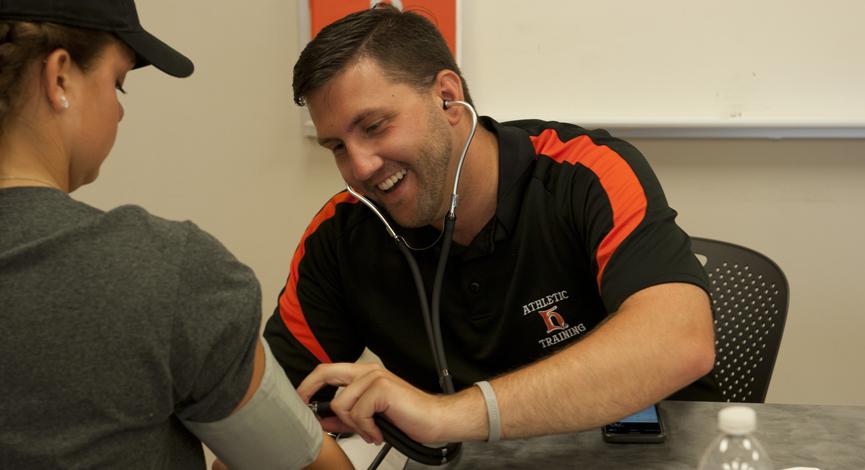
Concussions are big news. Concern about concussions as a serious form of brain injury that requires appropriate treatment has been steadily increasing among the general public and especially among the scientific and athletic communities. Despite a campaign to raise awareness about concussion injuries in sporting events, there’s still a mentality for athletes to tough it out, fight through symptoms and stay on the field to help their teams.
Heidelberg is joining other colleges nationwide in a research study designed to improve education and awareness about the issue and ultimately facilitate concussion self-reporting among student-athletes. It will require a culture change at the grassroots level and beyond.
Beginning in January, coaches from six ’Berg teams and about 200 student athletes will participate in the Chestnut Hill College Peer Concussion Education Program. The study is being funded by the NCAA and the U.S. Department of Defense’s Mind Matters Challenge. According to Tyson Depinet, coordinator of Athletic Training Services and instructor of health sciences and athletic training, Chestnut Hill College sought Heidelberg’s participation in the study.
“When presented with the opportunity to be involved, we thought it would prove beneficial to our institution and our students, so we decided to jump on board,” said Tyson. “Ultimately, the research is constructed to help educate and place an emphasis on the student-athlete’s role in understanding how serious a concussion is and allowing the health care team to treat them appropriately.”
According to the Mind Matters Challenge website, the program focuses on two initiatives: First, research designed to identify key factors and methodologies to change the culture and behavior of college student-athletes and second, an educational program meant to improve the effectiveness of concussion awareness programs delivered to student-athletes.
For Heidelberg’s part in the study, five athletic trainers – Tyson, Lauren Belliveau, Kaleigh Heath, Ashley Parsell and Mitch Geddis – will conduct the research about concussion education, assessment, reporting and management. Participating are the football team, the wrestling team, the men’s and women’s soccer teams, the women’s basketball team and the softball team.
Tyson explained that two members of each team will be selected and then, they will receive concussion education from the athletic trainers. The student-athletes will then educate their respective teammates.
A primary goal of the research study is to train student-athletes to become peer concussion educators, ultimately transforming the culture of concussion from within the team as opposed to relying exclusively on experts from outside the team. Athletic trainers and coaches agree that this change in perception, attitude and behavior could play a key role in increasing concussion reporting and initiating appropriate care in a timely manner.
“This research approach is a unique design in that it focuses on improvement in an area that hasn't been explored extensively at this level. There has been significant research and program implementation focus on pre- and post-concussion assessment tools and return-to-play and return-to-learn protocols, which is great.” Tyson said. “But, to be involved in research with a focus on addressing concussions proactively at the forefront with increased awareness, and the potential to improve the student-athlete experience, is something that we are very excited to play a role in.”
The research study at Heidelberg will take place early in the spring semester and be completed in mid-February.